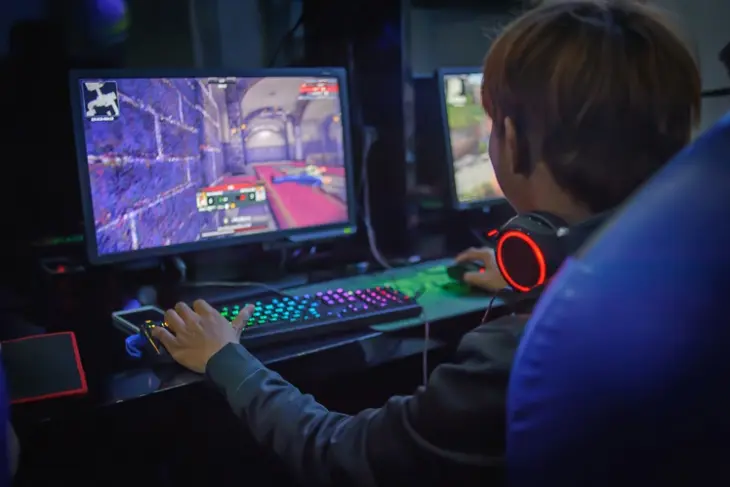Artificial intelligence (AI) is fundamentally transforming the gaming industry in ways that were once thought to be the realm of science fiction. With advancements in machine learning, procedural content generation, and real-time decision-making, AI is redefining not only how games are made, but also how they are experienced. Here are the key ways AI is shaping the future of gaming:
1. Smarter Non-Player Characters (NPCs)
AI is enhancing the behavior of NPCs in games, making them more intelligent, reactive, and lifelike. Traditional NPCs followed scripted behaviors, but with AI, these characters can adapt to player actions, providing a more dynamic and personalized experience. Games like The Last of Us Part II and Halo: Infinite have demonstrated the power of AI-driven NPCs, who can make decisions based on the player’s actions and environmental factors. This creates a more challenging and indulging experience where the gameplay evolves based on AI responses.
2. Procedural Content Generation
AI is also revolutionizing the way game worlds are created. Instead of manually crafting every environment, developers are increasingly using procedural generation, where algorithms create vast, varied worlds on the fly. Games like No Man’s Sky have used procedural generation to create billions of planets, each with unique landscapes, ecosystems, and resources. This technology reduces development time and provides players with near-infinite exploration opportunities, making the world feel truly alive and constantly changing.
3. Personalized Gaming Experiences
AI is enabling games to tailor experiences to individual players. By analyzing gameplay data, AI can adjust difficulty, mission objectives, and even in-game events to suit the preferences and abilities of the player. This personalized approach allows games to adapt in real time, making them more enjoyable and accessible. Games like Shadow of Mordor have used AI-driven systems like the Nemesis system, where characters remember player actions and react accordingly, creating a dynamic narrative tailored to the player’s decisions.
4. Improved Game Testing and Quality Assurance
AI is being used in the game development process itself to streamline quality assurance and bug testing. With machine learning, AI can automate the process of identifying bugs, glitches, and performance issues by playing through games in a human-like manner. This speeds up development and reduces the likelihood of errors making it into the final product. AI can also simulate millions of gameplay scenarios to ensure stability across different systems and configurations.
5. AI-Powered Game Design Tools
Game designers are also leveraging AI-powered tools to assist in the creation of levels, characters, and storylines. For instance, AI tools can analyze existing content and generate ideas or assist with the creation of new art assets. Tools like OpenAI’s GPT-3 have the potential to generate dialogue or even entire quests, aiding developers in storytelling. AI-driven design assistants can also help optimize gameplay mechanics by simulating how changes to mechanics would affect player experience.
6. AI-Enhanced Graphics and Realism
AI is also enhancing the visual quality of games, with AI-driven algorithms improving texture rendering, image upscaling, and even character animation. Tools like NVIDIA’s DLSS (Deep Learning Super Sampling) use AI to upscale lower-resolution images, allowing games to run smoothly while retaining high visual fidelity. This enhances realism, especially in open-world and VR games, where fine details and smooth performance are crucial for indulgion.
7. Voice Recognition and Interaction
AI-powered voice recognition and natural language processing (NLP) are allowing players to interact with games in new ways. Instead of relying on traditional input methods, players can speak directly to the game, giving commands or even engaging in dialogue with NPCs. Games like Star Wars Jedi: Survivor or Detroit: Become Human are using advanced voice interaction to deepen player involvement, allowing them to communicate with characters in a more intuitive, natural way.
8. AI in Game Streaming
AI is also transforming the gaming experience for streamers and viewers alike. Platforms like Twitch and YouTube are employing AI to recommend content, moderate live chats, and even create highlights of streams. AI algorithms help suggest content that aligns with the viewer’s tastes and ensure that toxic behavior is minimized in live-streamed games. AI tools also allow streamers to engage with their audiences more effectively, offering personalized feedback and interactions during broadcasts.
9. AI in Game Economy and Microtransactions
AI is being used to enhance the economy of games, especially in online multiplayer games and games with in-game economies. AI can predict player behavior and adjust virtual economies in real-time, ensuring balanced gameplay and managing supply and demand for in-game items. This also extends to microtransactions, where AI can help developers offer personalized deals or discounts to players based on their spending habits, improving engagement while avoiding player fatigue.
In summary, AI is not only improving the technical aspects of gaming—such as NPC behavior, procedural generation, and game testing—but also enriching the player experience through personalized content, smarter interactions, and enhanced realism. As AI continues to evolve, the potential for more engaging, lifelike, and personalized gaming experiences is immense, making it a key driver of the future of gaming.
With AI continuing to reshape everything from game development to playability, it’s clear that the future of gaming will be far more intelligent, interactive, and dynamic than ever before.

